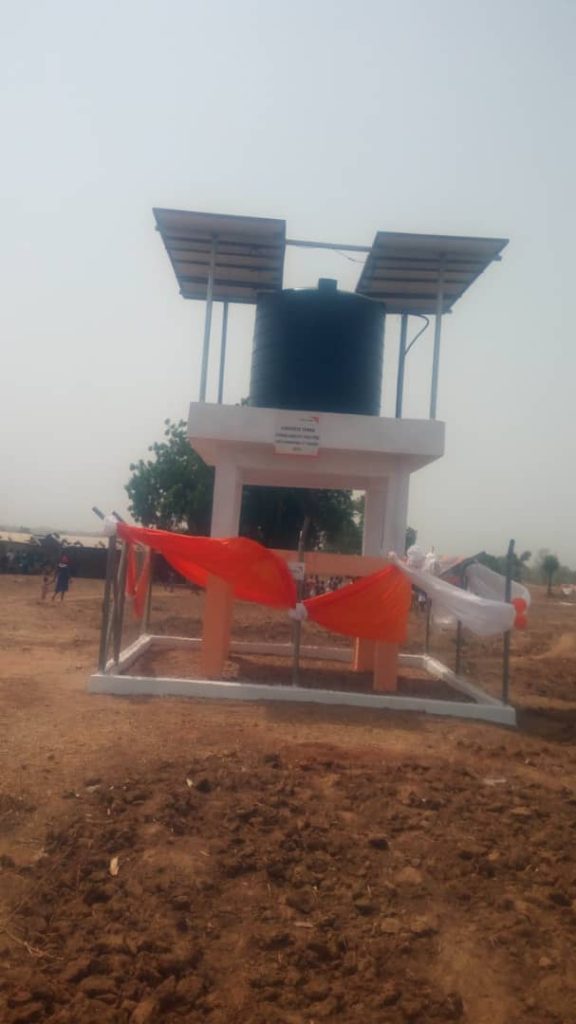By: Bajin D. Pobia
Woloyiri (UWR), Feb. 25, GNA – The World Vision has provided potable water for the people of
Woloyiri community in the Wa West District, who hitherto were deprived of accessing safe and clean drinkable water, especially during the dry season.
The facility costs US$20,000 and would supply potable water to about 2,500 residents of the Woloyiri community.
It has a 45-metre depth well and can yield a quantity of 50 litres of water per minute supplied into a 7000 litres Poly-tank storage capacity installed on a concrete tower.
World Vision Ghana and its partners funded the project, which has three standpipe points located at various vantage places within the community to make water supply readily and accessible to the residents.
Commissioning it, Madam Carla Denizard, the West Africa Regional Leader of World Vision International, said the goal of World Vision is to reach out to the vulnerable and deprived communities where people, especially women and children were suffering to acquire basic needs to improve on livelihoods.
She said women in the community were walking several hours on daily basis and were unable to find safe and clean water from the ponds and dugouts during the dry seasons.
That resulted in children in the households getting sick and could not go to school and parents could not also go to the farm after the consumption of water from contaminated sources, sometimes leading to the death of people, particularly children in the community.
Madam Denizard noted that the unpleasant situation made World Vision see the need to put in the Solar Mechanised Well to provide safe and clean drinkable water for the residents.
Not only did it provide one standpipe point, but three standpipes at different locations within the community to benefit the people to become healthy and productive.
She said World Vision had plans to put in another solar mechanised borehole in the other part of the community to make potable water accessible to the people who were far from the present facility, and would, as well, extend water supply to the schools to enhance teaching-learning.

The West Africa World Vision Regional Leader said the vision and mission of establishing the facility would be defeated if a single person was denied or prevented from having access to the water and utilising it for his or her livelihood and wellbeing.
She said it was painful to hear that some deaths occurred in the community because of water borne diseases and urged the community leaders to take good care of the facility since the community was poor in water provision during the dry season.
“Therefore, the provision of the water is to support the residents to become healthier and use the hours they often wasted in the search for water into productive ventures and enterprises,” she said.
“I encouraged you to work together as a team to ensure the sustainability of the facility to adequately serve the various segments of the population, especially children in the community,” she pointed out.
She said development work required the effective participation of all working together in unity and peace, to help bring more development projects to the community
Madam Denizard commended the people for ensuring a peaceful environment and good working relations in partnering with workers of World Vision to deliver the project and assured them of the provision of more projects, especially water in the communities to secure them from waterborne diseases.
She appealed to the Wa West District Assembly to take the maintenance of the facility seriously to make it sustainable and beneficial to the people.
Madam Vida Diorotey, the District Chief Executive of Wa West pleaded with World Vision to consider other communities in the district that were also in dire need of water and other basic amenities.
She said the district was very vast with a population of more than 98,000 and it was home to more than 256 communities thereby making it difficult to provide all the essential social and economic needs of the people.
Madam Diorotey said World Vision programmes such as Food Security, Child Protection, Water, Sanitation and Hygiene and Health among others were in the right direction and impacting positively on the lives of the people.
She assured the World Vision of the District Assembly’s cooperation and partnership to deliver the needed projects to the people in the communities to improve health and livelihoods.
The GNA observed that communities such as Woloyiri, Laadayiri, Dariguoteng, Laadayiri, Dariguoteng, Yeleyiri and Kolaatateng were not connected to the national electricity grid while telecommunication networks in the area were also poor and could not be accessed.
GNA